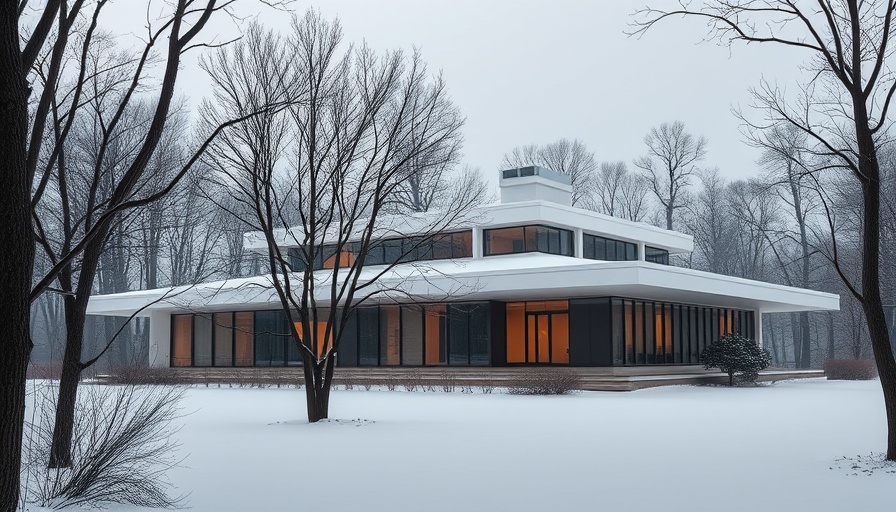
Reimagining Usonian Design: A Modern Approach to Workspace
In today's fast-paced digital age, the need for comfortable and efficient workspaces has never been more crucial, especially for digital nomads. The recent design by Specht Novak Architects of the Log Tavern Pond House in Pennsylvania demonstrates how innovative architecture can influence our daily work habits and inspire a productive environment.
Bringing Nature Indoors: Elements of the Design
Specht Novak Architects embraced the Usonian design principles originally championed by Frank Lloyd Wright. The house, which is wrapped in blackened-wood siding and features an open floor plan, creates an atmosphere that promotes focus and well-being. The extensive use of floor-to-ceiling windows invites natural light while offering stunning views of the lake, engaging the occupants with nature—a key element for sustaining creativity and productivity during long work hours.
Open Spaces for Dynamic Living and Working
The layout of the Log Tavern Pond House is particularly noteworthy. Designed as a compact yet spacious environment, the interior flows seamlessly from the garage to communal areas, like the kitchen and dining spaces, which can serve as collaborative work areas for digital nomads. This layout allows for versatility, accommodating both work and social interactions, vital components for those who work remotely.
Prioritizing Comfort: Ergonomics Meets Aesthetic
A core consideration in the design is to blend comfort with aesthetics. Ergonomics—an essential focus for creating functional workspaces—was respected in the choice of materials, such as light-colored rift-sawn oak for flooring, which not only adds warmth but also aligns with principles of healthy design. The open-plan arrangement contributes to a sense of freedom, sifting away the confines typically found in traditional office settings.
Alleviating Distractions with Strategic Architecture
The architects at Specht Novak understood the importance of balancing openness with privacy. The strategic design of overhangs provides shade while keeping distractions at bay, which is crucial for anyone needing to concentrate on their work. With cross-ventilation from operable windows, the potential for passive cooling allows for a fresh environment without the buzz of traditional air conditioning, further enhancing focus.
A Personal Retreat for Productivity
For digital nomads, a workspace is more than just a desk; it’s a personal sanctuary. The crow's nest-shaped upper pavilion at Log Tavern Pond House serves as a serene spot to wind down or reflect after a day of work, featuring a roof deck with a spa that invites relaxation. This emphasis on personal well-being highlights a shift toward designing spaces that cater to both productivity and the need for moments of peace.
Conclusion: Creating Your Ideal Workspace
As remote work continues to evolve, the lessons learned from the Log Tavern Pond House can empower digital nomads in their quest for the perfect workspace. Drawing influence from nature, embracing open designs for collaboration, and ensuring comfort through ergonomic choices will not only enhance productivity but also improve quality of life. Consider these elements as you design or adapt your workspace.
Whether you’re in a cozy corner of your home or at a lakeside campus, incorporating natural light and inviting materials can transform how you work, leading to better outcomes and heightened creativity.
 Add Row
Add Row  Add
Add 




Write A Comment